Text
Internet seems to be a bit faster this morning? She is feeling better?
0 notes
Text
English also doesn't have clusivity, unlike lots of languages across the world. That lets you distinguish with a pronoun the difference between "we" inclusively, meaning me, you and maybe other people too, and "we" exclusively, meaning me plus some other people but not the person I'm speaking to.
It seems like it would be so useful. Instantly you could distinguish between:
"We (exclusive) are going to get naked and dance around a bonfire" - OK, have fun, stay warm, see you tomorrow!
"We (inclusive) are going to get naked and dance around a bonfire" - so is this part of the standard new starter induction at this job or is there an alternative available?
English requires clarifying questions and that's no way to make new bonfire friends.
my biggest pet peeve wiht the english language is that you don’t have sin/sina
in swedish if u have two people who use the same pronoun u can always tell whos doing what bc its like ‘han tog sin väska’ (he took his[own] bag) and ‘han tog hans väska’ would be that he took the other persons bag
but in english its like if u have 2 ppl w/ the same pronoun:
“she took her bag” whose bag????WHose BAG was it her OWN bag or the other her’s bag??????????????
“he ate his donuts” were the donuts his own???? did he fucking eat someone elses donuts??? YIU DONT KNOW bc english is a bullshit language
201K notes
·
View notes
Text
do you ever remember the note the scribe left at the end of catullus manuscript G and want to burst into tears
11K notes
·
View notes
Text
Captain Wentworth had no fortune. He had been lucky in his profession; but spending freely, what had come freely, had realized nothing. But he was confident that he should soon be rich: full of life and ardour, he knew that he should soon have a ship, and soon be on a station that would lead to everything he wanted. He had always been lucky; he knew he should be so still. Such confidence, powerful in its own warmth, and bewitching in the wit which often expressed it, must have been enough for Anne; but Lady Russell saw it very differently. His sanguine temper, and fearlessness of mind, operated very differently on her. She saw in it but an aggravation of the evil. It only added a dangerous character to himself. He was brilliant, he was headstrong. Lady Russell had little taste for wit, and of anything approaching to imprudence a horror. She deprecated the connexion in every light.
It's interesting to me, Persuasion is the last novel Austen wrote and she had this trend prior of "W" being a villain (Wickham and Willoughby) and this paragraph about Wentworth makes me think about her other dubious men. He's gambled or spent all his money away, just like the other two, he's confident he'll get more. Wentworth and Henry Tilney are the only heroes with wit, but only Wentworth has this magnetic charm that seems to draw every woman in the room. Very Wickham of him, recall how drawn every female was to him when he came into Meryton. Wentworth feels a lot like Austen's villains, especially at first.
It makes me feel that Lady Russell was right to be worried. This sort of magnetic person, with very pretty words but no substance to back it up. It could have been a Willoughby-esq whirlwind romance and left Anne with nothing.
280 notes
·
View notes
Text
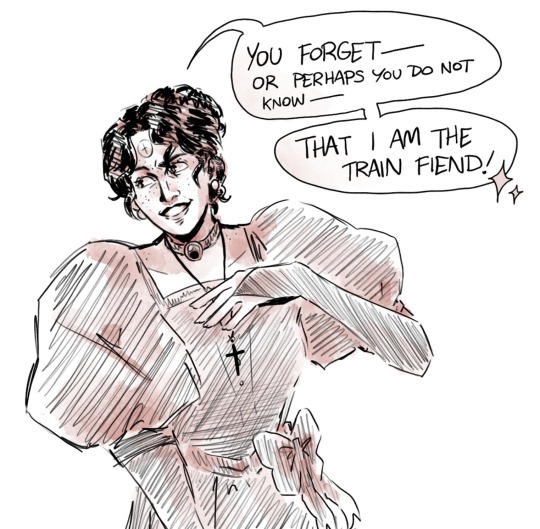
Goth girls love trains
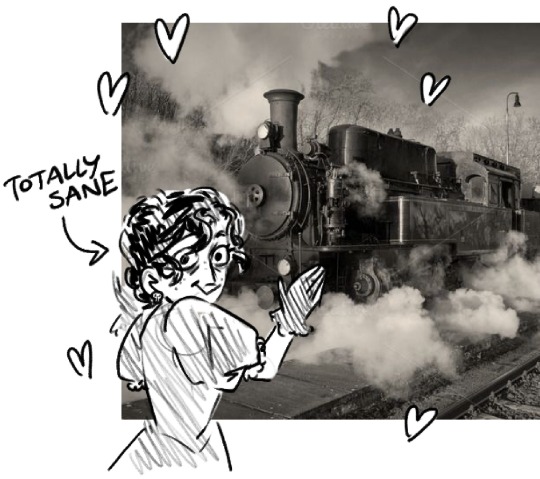
390 notes
·
View notes
Text
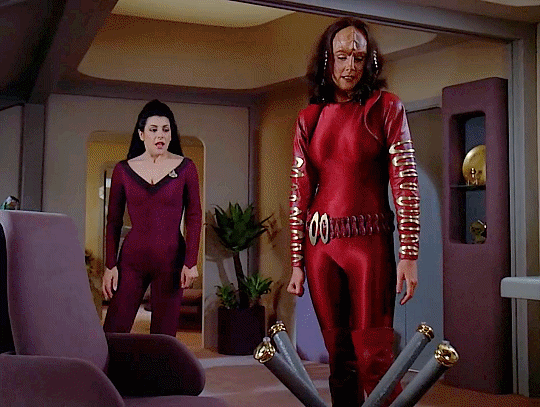


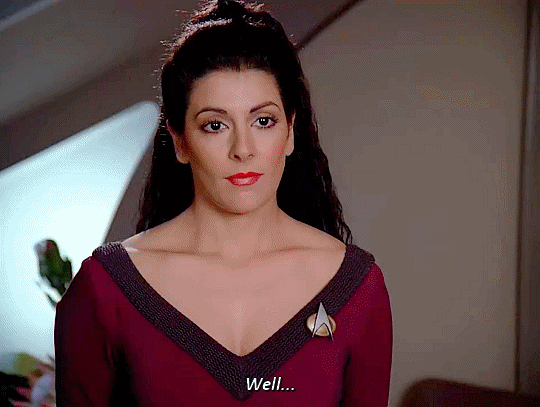
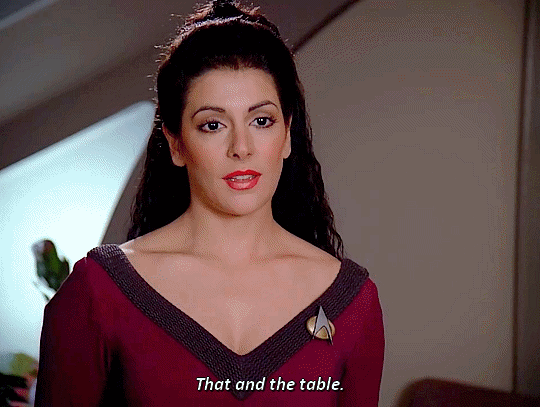

STAR TREK: THE NEXT GENERATION - S2E20 The Emissary
978 notes
·
View notes
Text
OK, I've successfully survived Yorkshire's slowest internet until bedtime, thank you all for bearing with me through this difficult time :)
Any suggestions for what I should do in a rural B&B with unexpectedly terrible wifi?
Suggestions are going to have to be in text form because I can't load anything else.
26 notes
·
View notes
Note
Would the Suitor Squad be an entertaining company in a rural B&B
Definitely! They've had heaps of practice entertaining one another around campfires after all. Quincey would stop Arthur from becoming too formal and Jack from becoming too serious. Even just people-watching those three from a distance would be fun.
0 notes
Text
Main characters of Substacks I'm currently reading, in ascending order of how much I'd enjoy their company in this rural B&B with dreadful wifi:
Walter, Marian and Laura from the Woman in White: I'm annoyed with Walter, Marian wouldn't like me (too female) and Laura and I would have nothing in common.
Helen Graham from the Tenant of Wildfell Hall: it'd be a kindness to bring her here away from her terrible husband, but she would definitely disapprove of my lifestyle and I suspect conversation would be strained.
Davie, Catriona and Alan from Kidnapped: I do not want to spend the evening with a pair of lovesick teenagers, no matter how sweet they are. On the other hand, Alan seems like a hoot.
Jeeves and Wooster from Letters Regarding Jeeves: this would definitely be a good time. The only danger is feeling like a third wheel.
Raffles and Bunny from Letters from Bunny: I'd still be a third wheel but these two are canonically fabulous dinner party guests. And I've no valuables with me so nothing to fear.
Any suggestions for what I should do in a rural B&B with unexpectedly terrible wifi?
Suggestions are going to have to be in text form because I can't load anything else.
26 notes
·
View notes
Text
On the plus side the tea-tray is very well-stocked. Instant hot chocolate and a little bar of Dairy Milk? Don't mind if I do.
Any suggestions for what I should do in a rural B&B with unexpectedly terrible wifi?
Suggestions are going to have to be in text form because I can't load anything else.
26 notes
·
View notes
Text
Any suggestions for what I should do in a rural B&B with unexpectedly terrible wifi?
Suggestions are going to have to be in text form because I can't load anything else.
26 notes
·
View notes
Text
I might need to revisit this at the end of the novel depending on how things turn out, but currently I'm a bit more inclined to read the Walter/Laura marriage as intended to be positive and romantic than you are. It's not exactly one of the great romances of Victorian literature, but I think the intent is that it's sweetly understated rather than purely practical. I guess I think the message is that if you must marry, make sure to pick a good one, but Marian is here to remind you that it's just fine to stay single too.
I'm also reminded of how Wilkie Collins ended The Haunted Hotel:
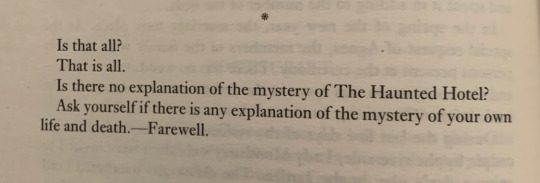
Which I think demonstrates your point about his cynicism quite neatly.
I have a bunch of thoughts inspired by @animate-mush and @vickyvicarious' discussion on asylums and madness in the Woman in White and Dracula, but that discussion moved on before I had a chance to add to it, so this is going to have to be a separate post.
I'm thinking about this from the perspective of Bad People vs Bad Systems.
The Woman in White is a novel what goes wrong is the fault of bad systems. Laura lives in a system - a patriarchal society - that enables bad people to take advantage of her, and denies her the means of protecting herself.
But it seems to me that Wilkie Collins doesn't quite commit to the idea. The system fails when it's abused by bad people like Sir Percival Glyde and Count Fosco. But Collins only shows things going wrong as a result of bad people in a bad system. He doesn't show that same system leading good people to do bad things.
It's noticeable when we get the revelation about Anne Catherick's parentage. Until then, Sir Philip Fairlie is presented as a good man, and Laura's slavish adherence to his wishes could be a demonstration of how the patriarchy causes even good men to make women suffer. But the reveal that Sir Philip Fairlie is Anne Catherick's father upends that: he's just yet another morally flawed man in Laura's life. He doesn't harm Laura deliberately, but through Walter's narration Collins explicitly makes the connection between Sir Philip Fairlie's sins and everything that Laura suffers.
Contrast him with Walter, our morally pure hero. Walter often doesn't seem to treat Laura much better, but Collins clearly doesn't see it that way. For instance, it's striking to me how much Walter's treatment of Laura echoes her treatment in the asylum: she's confined to one location, lied to, and infantilised. Except when Walter does it, he's a good person, and it's presented as a good thing - even as romantic.
Wilkie Collins is more interested in talking about social issues than Bram Stoker is, but Stoker is more willing to take that further step and accept that bad systems also cause good people to do bad things. Jack Seward is a good person: he wants the best for his patients, he means well, but he also uses his power as an asylum-owner to abuse Renfield. The heroes exclude Mina from their discussions with the best of intentions, but it still ends badly for them. Collins never pursues this kind of storyline with Walter - or at least he hasn't yet, and I don't think it's coming.
Overall, harm in Dracula can happen regardless of intention. Harm in The Woman in White requires intention or at least indifference. I wonder how much of this is inherent to Collins' worldview, and how much is that the idea that patriarchal norms are bad even in the hands of good men would just have been a step too far for Collins' 1860s readership.
14 notes
·
View notes
Text

Where are all the Calvin and Hobbes enjoyers??
65K notes
·
View notes
Text
Alan had Catriona sit by him and wait upon his wants: he made her drink first out of his glass, he surrounded her with continual kind gallantries, and yet never gave me the most small occasion to be jealous; and he kept the talk so much in his own hand, and that in so merry a note, that neither she nor I remembered to be embarrassed.
Alan Breck Stewart: magnificent swordsman, loyal friend, expert wingman.
6 notes
·
View notes
Text
It's mostly class-based, isn't it? Certainly the rats speak like working-class Londoners, the moles like West Country labourers, and the hares like Bertie Wooster.
Redwall has really Weird Politics but my gut feeling is that they're the kind of Weird Politics that come from the author not thinking stuff through (see: why is it an Abbey when they don't seem to be religious) moreso than anything else
#i have an ill-thought-through idea that there's a kind of default politics#that you get as a british children's fantasy author unless you're actively trying to write something different#a kind of small-c conservative institution-focused worldview#and that's what you get in redwall but also in a bunch of other things
103 notes
·
View notes
Text
I have a bunch of thoughts inspired by @animate-mush and @vickyvicarious' discussion on asylums and madness in the Woman in White and Dracula, but that discussion moved on before I had a chance to add to it, so this is going to have to be a separate post.
I'm thinking about this from the perspective of Bad People vs Bad Systems.
The Woman in White is a novel what goes wrong is the fault of bad systems. Laura lives in a system - a patriarchal society - that enables bad people to take advantage of her, and denies her the means of protecting herself.
But it seems to me that Wilkie Collins doesn't quite commit to the idea. The system fails when it's abused by bad people like Sir Percival Glyde and Count Fosco. But Collins only shows things going wrong as a result of bad people in a bad system. He doesn't show that same system leading good people to do bad things.
It's noticeable when we get the revelation about Anne Catherick's parentage. Until then, Sir Philip Fairlie is presented as a good man, and Laura's slavish adherence to his wishes could be a demonstration of how the patriarchy causes even good men to make women suffer. But the reveal that Sir Philip Fairlie is Anne Catherick's father upends that: he's just yet another morally flawed man in Laura's life. He doesn't harm Laura deliberately, but through Walter's narration Collins explicitly makes the connection between Sir Philip Fairlie's sins and everything that Laura suffers.
Contrast him with Walter, our morally pure hero. Walter often doesn't seem to treat Laura much better, but Collins clearly doesn't see it that way. For instance, it's striking to me how much Walter's treatment of Laura echoes her treatment in the asylum: she's confined to one location, lied to, and infantilised. Except when Walter does it, he's a good person, and it's presented as a good thing - even as romantic.
Wilkie Collins is more interested in talking about social issues than Bram Stoker is, but Stoker is more willing to take that further step and accept that bad systems also cause good people to do bad things. Jack Seward is a good person: he wants the best for his patients, he means well, but he also uses his power as an asylum-owner to abuse Renfield. The heroes exclude Mina from their discussions with the best of intentions, but it still ends badly for them. Collins never pursues this kind of storyline with Walter - or at least he hasn't yet, and I don't think it's coming.
Overall, harm in Dracula can happen regardless of intention. Harm in The Woman in White requires intention or at least indifference. I wonder how much of this is inherent to Collins' worldview, and how much is that the idea that patriarchal norms are bad even in the hands of good men would just have been a step too far for Collins' 1860s readership.
14 notes
·
View notes
Text

Magdalena Patyk aka Madziowa P aka Magda Patyk (Polish) - Drawings: Charcoal on Paper
111 notes
·
View notes